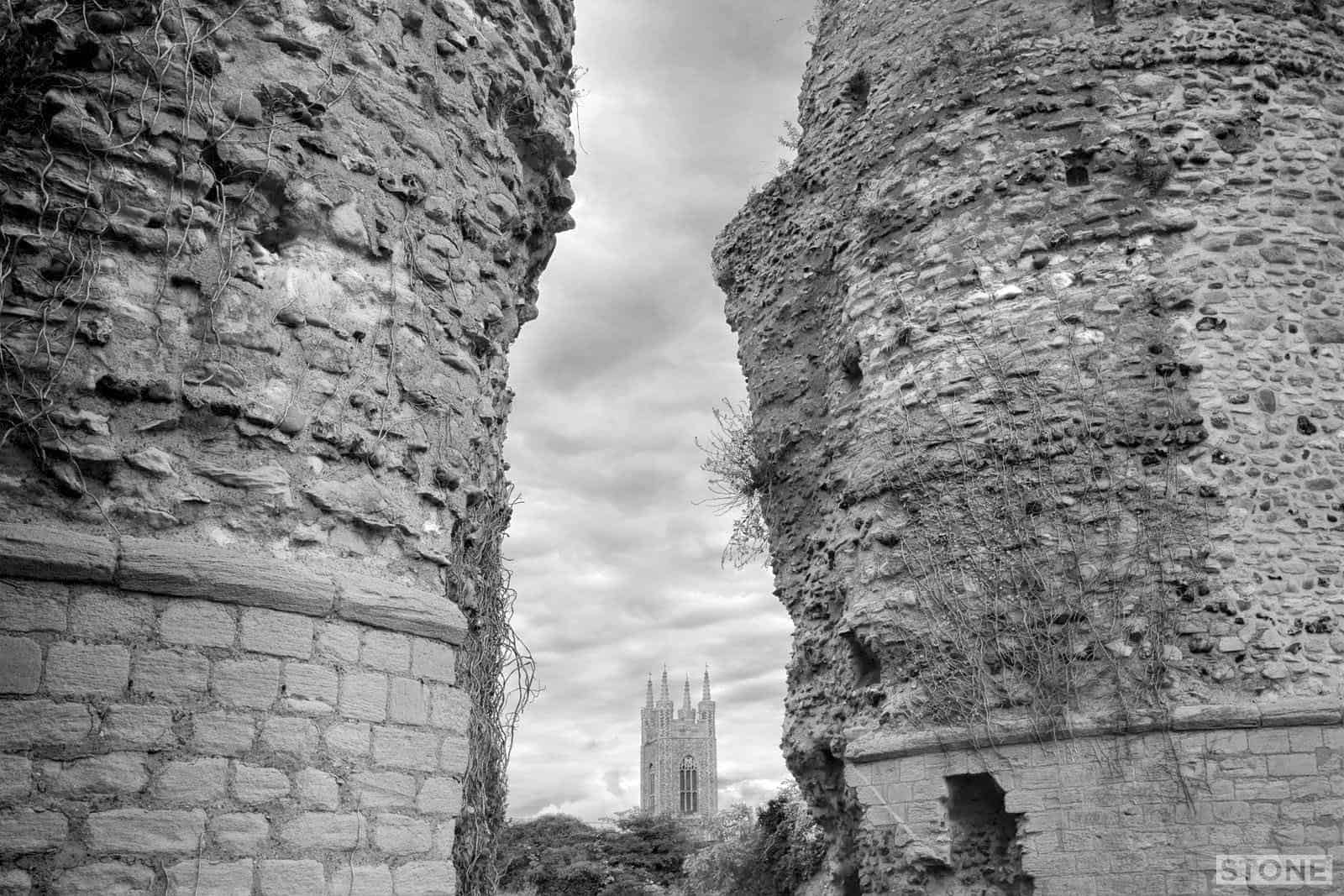“There were assembled at the same season, to hear divine service and common prayer in the parish church of Bongay, the people therabouts inhabiting. Immediately hereupon, there appeared in a most horrible similitude and likenesse to the congregation then and there present, a dog as they might discerne it, of a black colour…This black dog, or the divel in such a likenesse…runing all along down the body of the church with great swiftnesse, and incredible haste, among the people, in a visible fourm and shape, passed between two persons, as they were kneeling upon their knees…wrung the necks of them bothe at one instant clene backward, in so much that even at a moment where they kneeled, they strangely dyed…
…the same black dog, stil continuing and remaining in one and the self same shape, passing by another man of the congregation in the church, gave him such a gripe on the back, that therwith all he was presently drawen togither and shrunk up, as it were a peece of lether scorched in a hot fire; or as the mouth of a purse or bag, drawen togither with a string. The man, albeit hee was in so straunge a taking, dyed not, but as it is thought is yet alive…
…The Clark of the said Church being occupied in cleansing of the gutter of the church, with a violent clap of thunder was smitten downe, and beside his fall had no further harme, there are remaining in the stones of the Church, and likewise in the Church dore which are mervelously renten and torne, ye marks as it were of his clawes or talans. Beside, that all the wires, the wheels, and other things belonging to the Church, were wrung in sunder, and broken in peces. These things are reported to be true… The storm (and dog) then fled off to Blythburgh.”
This is a summary of something which was written about the Bungay Black Shuck in 1577. It was written at some point after the 4th of August which was when the event is said to have happened, by coincidence it is noticeably the 4th of August today (or was when I wrote this). But I’m not in Bungay writing this 438 years later, I’m in Norwich. Abraham Fleming when he wrote this, was in London. Neither of us were there, we are or were both in relatively Shuck free places, London has a handful of Black Dog tales, Norwich has fewer still. The best I’ve got is a beige terrier that smells of cheese.
It’s an evocative piece of writing, a piece of writing that has since passed pretty much unquestioned into the lore of the people of South Norfolk and North Suffolk. Much the same as the story of Blythburgh has with it’s ‘claw marks’. There are two or three other main variants of Shuck in Norfolk. It’s difficult to work out from the accounts exactly what happened because chances are that whatever it was isn’t reflected in the story Fleming wrote anymore than how modern day events or what we sometimes call news are reflected in our own specious and occasionally nauseating tabloid press and certain TV channels news coverage. ‘Why let facts get in the way of a good story’ is too obvious a route to take, when in fact it is more of a case of why not let a belief system dictate how a story unwinds itself, and let the prevailing culture draw it out. We see stories change all the time, perspectives differ, people react at distance, gossip and loose tongues and tittle-tattle move the story around like a boiled sweet, until it quite often is ten different fractured stories all of which are almost-fact or half-truth or perceived-truth, but are almost entirely fictionalised.
Fleming would have been about 25 when he wrote it, he was still studying at Cambridge; a poor student in the fiscal sense, and despite having to work to pay to be educated was dedicated to translating and learning. A clever chap, a Jude the renown in fact. He died with 70 books under his belt. He was also an early Calvinist and latterly a man of the cloth. His writing cover a wide variety of subjects, mostly translations of Greek and Latin. He also wrote a History of England, meandered into writings on earthquakes. He also completed a treatise on witchcraft, which was after all serious stuff at the time, Best of all he translated ‘A Paradoxe, proving by reason and example that baldnesse is much better than bushie haire’ by Synesius. Which might be true if you’re bald, I don’t know because I haven’t read it and I’m not bald. Maybe he needed a break from the heavy stuff and the tabloids.
There are plenty of contemporary accounts of the devil appearing, witches and familiars, sprites and strange beasts being summoned or ones that just loom out of the dark. It is part of the mental or metaphysical landscape of the time that whatever really happened happened. So what we are really looking at is a case of interpretation and Chinese whispers. Take the phrase, ‘gave him such a gripe on the back, that therwith all he was presently drawen togither and shrunk up, as it were a peece of lether scorched in a hot fire; or as the mouth of a purse or bag, drawen togither with a string’. Almost as if he was burned by something perhaps, like a lightning strike. You can almost see the image of a man in the throes of a post electrocution spasm in his words, if you can’t, then Google it very carefully.
There are other records; the Bungay Churchwarden’s Book and register both mention the exceedingly vicious storm, the parish register records the death of two men in the bell tower of St. Mary’s, neither mention the Devil or a Black Dog, or a black dog in the devil’s place. Holinsheds of 1585-7 and Stow’s Annals of 1580 also mention the storm but don’t relate what would have been the bigger story of Old Nick or his emissary arriving, in fact they don’t mention anything odd or red eyed or black and shaggy at all.
If for a minute you imagine possibly the worst storm you’ve ever seen, and then you imagine being someone quite possibly ill-educated, a God fearing man because that’s generally what your choice is, someone who believes in original sin (as in, we’re all sinners and born that way), who believes that the devil isn’t simply Tim Curry wearing big horns and red make-up camping it up a bit, but is actually a seriously bad entity you don’t want to either upset or for him to be someone that can lay claim to your soul. Evil as a metaphysical presence in this world – someone who might want to stick hot metal in your dangly bits in the next life. Now imagine a town which has lots of timber in its fibre and no fire brigade, and lightning, lots of fierce lightning. You can also step back further and sideways slightly into the movie theatre past where the primitives run, quite sensibly fearing the angry almost Abrahamic smiting style God of the sea struck ship or the volcano. You’re half way to understanding how in this instance Shuck is borne into the story on the shoulders of some of our primitive instinctive motivations. Were lightning to strike the church, who knows what went on inside. And it wouldn’t be the only time or the least likely high point to attract a bolt out of the black. Widecombe, Blythburgh, Cornhill – and more. It is the same supernature; the wonderment, the wish fulfilment, the fear, lack of understanding or comprehension that turns desert weather balloons, helicopters, and jets into flying saucers, or creates ghosts in boring suburban cul-de-sacs. And more importantly it’s what makes a story into something worth repeating.


Hi Nick:
I was interested in your article on Ditchingham, and am wondering whether you give talks on your topics. I am chairman and programme secretary of the Bungay society and I’m compiling our programme for next year. Could you let me know if you might be available to give a talk? we meet on the third Thursday of each month, at Bunny Community Centre.
Best wishes
Terry Reeve